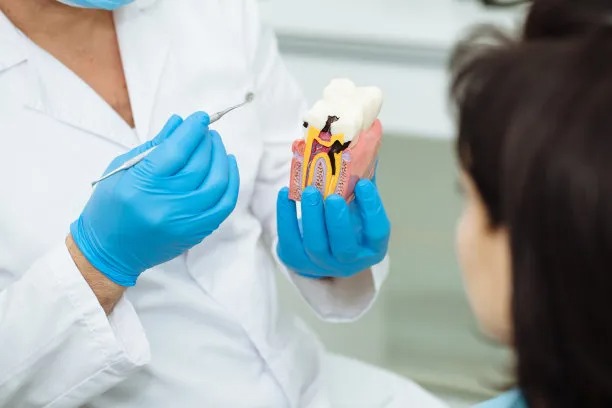Summary: Extracting a tooth, though often perceived as a daunting procedure, plays a pivotal role in maintaining dental health and overall wellbeing. This article outlines the intricacies of the tooth extraction process, delves into its significance in preventing further oral health issues, discusses the psychological impact often associated with tooth loss, and emphasizes the importance of professional dental care throughout the extraction journey. By understanding these aspects, patients can better navigate the challenges and benefits associated with tooth removal, ultimately leading to a healthier mouth and improved quality of life.
1. The Tooth Extraction Process Explained

The process of tooth extraction is a methodical procedure carried out by dental professionals to remove a tooth from its socket. Typically, this procedure is performed under local anesthesia to minimize discomfort. First, the dentist will thoroughly examine the tooth and surrounding gum tissue, perform necessary X-rays, and prepare the area for extraction. In some cases, sedation may be employed to alleviate anxiety, especially for patients apprehensive about the procedure.
Once the area is properly numbed, the dentist uses specialized instruments to loosen the tooth from its socket. This involves carefully detaching the ligaments surrounding the tooth and taking into account the tooth鈥檚 roots configuration. After the tooth is loosened, it is gently removed using forceps. In complex cases, such as impacted wisdom teeth, the extraction may require surgical intervention.
Post-extraction care is crucial for recovery. Patients are given aftercare instructions, including management of swelling, pain relief, and hygiene practices to prevent infection. Following these guidelines helps ensure a smooth healing process and reduces the risk of complications.
2. Preventing Future Dental Issues
Removing problematic teeth can prevent numerous long-term dental issues. For example, extracting a decayed or infected tooth can stop the spread of infection to adjacent teeth and gums. An untreated tooth can lead to severe conditions, including abscesses, which may necessitate more extensive treatments, such as root canals or even hospitalization.
Additionally, crowding teeth can lead to misalignment. Extracting a tooth can create necessary space for orthodontic treatments, resulting in properly aligned teeth. This not only improves aesthetics but also aids in proper bite function, which can prevent issues such as temporomandibular joint disorders.
Regular dental check-ups are essential for identifying potential problems early on. Dentists can recommend timely extractions to avoid future complications, ensuring that patients maintain a healthy smile and overall oral health.
3. The Psychological Impact of Tooth Loss
The loss of a tooth can have significant psychological implications for many people. Beyond the physical aspect, tooth loss often leads to feelings of embarrassment, diminished self-esteem, and social anxiety. Individuals may feel self-conscious about their appearance, which can impact their social interactions and overall confidence.
Furthermore, the psychological burden of tooth loss can lead to changes in lifestyle. Some may refrain from participating in activities they once enjoyed, such as dining out or social gatherings, due to worries about their smile. This can contribute to a feeling of isolation and decreased quality of life.
4. Importance of Professional Dental Care
Professional dental care is paramount throughout the tooth extraction process. A qualified dentist not only ensures the procedure is conducted safely and efficiently but also provides essential guidance before and after extraction. Routine dental visits allow for early detection of potential issues, which can lead to timely interventions when needed.
Following extraction, a dentist monitors the healing process closely, ensuring that there are no complications. They can provide tailored advice based on individual recovery experiences and recommend restorative options such as dental implants or bridges to replace missing teeth, which can restore functionality and aesthetics.
Moreover, professional care extends beyond the procedure itself. Dentists emphasize preventive measures through education about oral hygiene, dietary choices, and regular check-ups, all of which contribute to maintaining overall dental wellbeing.
Summary:
Tooth extraction is a significant aspect of dental health management that fosters both physical and psychological wellbeing. By understanding the extraction process, recognizing its preventative benefits, and appreciating the psychological implications, individuals can approach this treatment with a constructive mindset. Overall, professional dental care remains crucial for ensuring optimal recovery and maintaining a healthy smile.
This article is compiled by Vickong Dental and the content is for reference only.
Vickong Dental
Vickong Dental is a large medical group established in Hong Kong in 2008 by professors from well-known medical universities in Guangdong and Hong Kong, as well as medical doctors from key national '985' universities (including Master's supervisors and senior professors). The chain of branches brings together expert dentists with PhDs and Master's degrees from Hong Kong and Mainland China, committed to providing high-quality dental treatment.
"Vickong Dental Practices the University Motto of 'Healing and Serving Society,' with a Stable Operation for Sixteen Years. It Has Been honored with Hong Kong Enterprise Leaders's Choice,' and is a Global Trusted Implant Center for the Nobel Implant System. Recommended by Hong Kong Metro Broadcast and Guangdong Television, it Serves Customers from Over Thirty Countries and Regions, Gaining the Trust and Favor of Citizens from the Guangdong-Hong Kong-Macau Greater Bay Area and Surrounding Cities.

Thousands of customers' unanimous praise
The most recognized and highly recommended dental service by customers in the Guangdong-Hong Kong-Macau Greater Bay Area
We Ensure You Receive Detailed Care and Attention Here
Hong Kong standards, Shenzhen prices, Your Trusted English-speaking dentists

Vickong Dental Medical-Grade Instrument Disinfection Process
Vickong Dental Medical-Grade Instrument Disinfection Process

Vickong Dental Chain: A Warm and Comfortable Environment for Treatment






Appointment Hours

Q&A
Why choose Vickong Dental?
Vickong Dental practices the university motto 「Medicine to Benefit Society」, with each branch bringing together highly qualified dentists with doctoral and master’s degrees from Hong Kong and the Mainland, and has maintained seventeen years of steady operation。Recipient of 「2024 Hong Kong Enterprise Leaders Brand」, 「2025 Hong Kong Enterprise Leaders Brand」, a Nobel Biocare Global Trusted Implant Center, and a brand recommended by Metro Radio Hong Kong and Guangdong TV。
To date, we have served customers from more than thirty countries and regions,earning exceptionally high word-of-mouth recognition and trusted recommendations from residents across the Guangdong-Hong Kong-Macao Greater Bay Area and surrounding cities
We have eight major branches in Zhuhai、Shenzhen,and a consultation and service assurance center in Hong Kong,so you can book a free consultation at any time for any questions,which is very reassuring.
If I do not accept the quotation after the CT scan, will I be charged??
No! As long as the actual treatment has not started, you will not be charged any fees.
Will there be any additional charges during the treatment process?
No, there won’t be any additional charges. Before treatment begins, we will clearly explain the treatment plan and its corresponding fees. Only after the patient agrees and signs the consent form will we proceed with the dental service.
Can I pay in Hong Kong dollars?
Yes. Vickong Dental accepts payment in Hong Kong dollars. The amount will be converted based on the exchange rate of the day, and the applicable rate will be clearly communicated to you in advance.
Can I reschedule my appointment at any time?
Yes. Please contact us via **WeChat** or **WhatsApp** as early as possible, providing your original appointment time and details, along with your preferred new date and time slot for rescheduling.













